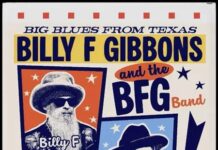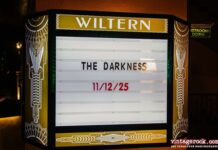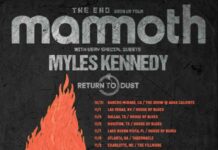Review by Shawn Perry
On the surface, Ian Anderson and Jethro Tull are pretty much one and the same. For the last few years, however, the singer has been trying to change that, somewhat. His solo albums — 2000’s The Secret Language Of Birds and 2003’s Rupi’s Dance — seemed to have replaced the notion of any further Jethro Tull studio albums. He’s even toured behind the albums, backed by an eclectic group of exceptional musicians, mixing new songs along with Tull classics, and toning down his usual antics for smaller audiences.
For his appearance at Anaheim’s Grove of Anaheim, Anderson played without a new album to support. But he still pushed the envelope, pulled out a few surprises, and dazzled us with the best and brightest, stripped down, embellished with a range of acoustic instruments. The crowd of nearly 1,700 ate up every last morsel.
To begin, the sparkling glitter of acoustic guitars arose amidst the sounds of a stormy night, washing over the audience. Anderson fell into a beautiful rendition of “Dun Ringill,” a rarely played nugget from Tull’s 1979 Stormwatch album. He kept going deep as he continued with “March The Mad Scientist,” another masterful stroke buried on Minstrel In The Gallery. In the process, everyone got their first whiff of the holidays.
Anderson’s band features current Jethro Tull members David Goodier on bass and John O’Hara on piano and accordion, along with drummer Mark Mondesir and guitarist Florian Opahle. This combination pumped some fresh juice into the cavalcade of timeless, mostly acoustic Jethro Tull classics.
Singing the high notes doesn’t come easy for the 62-year-old Anderson these days, but he remains the consummate showman. Over the course of the evening, he danced on one leg, kicked, twisted and blew his flute like the pied piper of rock and roll he has been since 1968. He also gave brief, humorous introductions for just about every song.
In 1974, he explained, Jethro Tull wrote what was presumably the first climate change song. Only the song, “Skating Away On The Thin Ice Of The New Day,” turned out to be what the singer termed, “a load of bullocks.” Fortunately, the tuneful melody, enhanced by Goodier’s gentle touch on the glockenspiel, outshined the erroneous lyrics.
“Tea With The Princess,” a new one Anderson co-wrote with sitarist Anoushka Shankar and dedicated to her father Ravi, introduced Meena Bhasin on viola to the audience. Over the years, both with Tull and on his own, Anderson has employed a virtuoso violinist, usually female and easy on the eyes, and Bhasin fits the bill. Tonight, she attacked the viola, larger in size and lower in pitch than a violin, with a fierce and brazen determination that instantly challenged the other musicians (the band also played Bhasin’s own “Driving Skies,” which showcased her virtuosity even further).
Of particular note was Mondesir, apparently substituting for regular drummer James Duncan (he’s also Anderson’s son). A renowned British jazz drummer who’s pounded out the beat for guys like John McLaughlin and Kevin Eubanks, Mondesir kept everyone on their toes with a steady, subtle, almost effortless approach. This made even quirky numbers like “Serenade To A Cuckoo” float with the greatest of ease and tempo.
Meanwhile, O’Hara took the accordion to new heights and Opahle played the acoustic guitar like Segovia and Reinhardt reincarnated. Anderson switched over to mandolin for “Fat Man,” a song apparently written with Mick Abrahams, Jethro Tull’s original guitarist, in mind. The first set finished up with “Rocks On The Road” from 1991’s Catfish Rising.
After a short break, Anderson appeared with an acoustic and a harmonica, and went into “Some Day the Sun Won’t Shine for You,” a jazzy blues shuffle from the first Jethro Tull album, This Was. The rest of the band, including Bhasin, joined in as a Middle Eastern/Celtic jam ensued. Opahle grabbed the spotlight for his own “Andantino,” but aside from a stylish turn on “Bourée, the ticket was pretty much filled with music from Aqualung — “Mother Goose,” “My God,” “Aqualung” and “Locomotive Breath.”
What makes it interesting for Anderson and the audience is the opportunity to changing the arrangements, moving the verses around, adding things that weren’t there before. When Anderson played the melody of “Aqualung” on the flute, the cadence turned it into a march. The main lick eventually broke through and suddenly the crowd, who had remained courteous and seated, started getting antsy.
By the time “Locomotive Breath” made its last round, the faithful Tullians had all but rose to their feet with their Blackberrys on “record” and their fix tied off until next year. That’s when Jethro Tull will be hitting the road again. And most likely, on a separate swing, another side of Ian Anderson will be out there too.




















